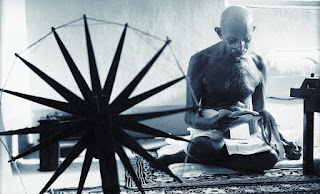RELEVANCE OF GANDHIAN IDEOLOGIES IN THE PRESENT ERA # 150th Birth Anniversary
RELEVANCE OF GANDHIAN IDEOLOGIES IN THE
PRESENT ERA
“There are many causes that I am
prepared to die for, but no causes that I am prepared to kill for”
~ M. K. Gandhi
The name of Mahatma Gandhi transcends the bounds of race, religion and nation-states and has emerged as prophetic voice of 21st century. Name “Mahatma” itself is explanatory about the great soul. He demonstrated that “Non-violence” could be an effective instrument of social change after the Great Buddha and Jesus. Gandhi taught the world, weary with wars and continuing destruction that adherence to truth and Non-violence is not for Individual behavior but also can be meant for global affairs. He has exercised most powerful influence on modern world. While Gandhi lived most of people believed that the Gandhian principles are relevant to win the freedom from British, but the relevance of ideology of Gandhi is more in present era in my opinion.
Gandhi
was a great karma yogi. Human being is worshipping God and practicing their
religion from immemorial time in their day to day life. Everybody thinks his
religion as supreme & considers others as inferior. This feeling of supremacy
of own religion is very dangerous & manifested as wars to prove superiority
of their religion. This divides us and
even terrorism is viewed from the angle of religion. Gandhi comes to a common
point that “Truth is God ”. If we all
can believe this fact then there will be no wars, no killing of innocent people
in the name of God. Religions of all will be respected by all. Gandhi believed
that different religion has same goal that is prosperity of humanity. There is
no distinction between different temples, mosques, churches. He was a great
believer of mutual tolerance. “Sarva Dharma Sambhaba” was his religion like
Swami Vivekananda’s Universal religion or Tagore’s Religion of Man.
Gandhi
could be best understood as a multi dimensional personality. Gandhi left India
for South Africa as a young barrister, trained in UK. The doctrine & craft
of Satyagraha was invented and designed by him on South African soil for
welfare of Indian community. He personally volunteered & nursed the wounded
in Anglo-Boer war. After 21 years he came back to India & discovered an
unfamiliar India. He decided to fight against British Raj and established
himself as a leader of Congress- kind of movement not seen before. As a
politician, hesticked to ethical values and his own thoughts. He was a
practical oriented man. He was inspired from past and dreamt and prepared for
future. He opposed mindless industrialism but had no problem using trains, ships,
clocks, public addressing system. Gandhi led India’s freedom struggle succeded
without alienating the people who colonized them through peaceful & non
violent struggle. Under his dynamic leadership, Non-cooperation movement, Quit
India Movement, Civil disobedience movement was being lead to attain our
freedom. When finally freedom dawned, he did not allow himself to be the
President or Prime Minister of our holy country but remain as an ordinary man
& become the firewall against communal strife. This is the example of his
self sacrifice and lessons to be taken for new generations. So how can we
relate Gandhi in everyday life, in our ethical values. From this we can learn.
He
emphasizes more on empowerment of weak & women. He witnessed the power of
women in South Africa. He said, “To call women the weaker sex is a libel, it is
men’s injustice to women.” He identified himself with the common Indian people
& recognised himself as “the humblest servant” of India & humanity. Now,
every country is focusing on women empowerment & women equality. This
intention is encouraged by leader like Gandhi. So, he is very much relevant in
present day. Because Gandhi did nothing new to teach the world & he himself
told that. But he tried to revive & make more understandable these old teachings like Truth & Non
violence to the whole world. There should be truth in speech, truth in thought,
truth in action. This value is waning day by day from human being. We are more
inclined to false propaganda, false well being. So, here is how we should
relate ourselves with Gandhian ideology. There is no dharma higher than truth.
Gandhi
is equally known for his ahimsa, “Ahimsa parama dharma”. Gandhiji believed that
Education as the light of life and only education can create an awareness of
oneness. Universality of religion can be best understood by universalization of
education. He believed harmony could not be achieved about overnight. He
promoted the process of patience, persuasion and perseverance to attain peace
& love for harmony. A nation built on foundation of non violence will be
able to withstand attack on its integrity within and without. Politics of
exploitation has been uprooted and politics of service is visualized. People’s
power replace the party politics, service to the people and their amelioration
has been gradually becoming the crucial factor all over the world, thus we cannot
minimize the relevance of Gandhian politics.
Gandhi
believes Swaraj is real democracy where each one realizes he or she is the
master of one’s self. Party system plays important role in parliamentary
democracy. This parliamentary democracy is inspired by British Parliament. He
deeply believed in democracy & calls it as
“a great institution” but cautions people not to copy the whole western
system of democracy which is very nominal democracy. Today’s context & sure
for future Gandhian democracy is the hope where democracy must be practised in
grassroot level.
Gandhi
is equally relevant economically to the today’s world. Gandhiji wanted that technology should design to serve human being not to make human
servant of machine. He promoted the employment opportunity in rural India over
30 million families of spinners, leather, marble, wood& metal workers, stone
carvers, carpet & rug makers. India earns over $1 billion by exporting such
items. Gandhi believed firmly in “Sarvodaya”. It means well being for all. Society
should function as a whole not being divided in social castes. So, he believed
in Trusteeship which is now being adopted by J.R.D.Tata, Jamnalal Bajaj,
Narayan Murthy, Azim premji. They spend their surplus wealth in the well being
of society in education or promoting toilet facilities etc. He is in full
favour of self sufficiency of villages. He emphasizes more on village
industries, health & hygiene. Children should get basic education and there
should be social justice. In recent years, P.M. Narendra Modi promotes “Swacch
Bharat Abhiyan” inspired by Gandhi. So, Gandhi is very much relevant in every
possible context in Indian scenario.
Gandhi
believed that achieving National
security and International peace, the path
of truth, nonviolence, justice & mutual agreements is to be taken. This
approach is embodied in UNESCO’s motto also. Now, it was courage rather than
fear, right rather than might and indomitable will rather than superior arms
that triumphed.
Gandhi
is more relevant in every aspect after many years of martyrdom. He is a prophet
martyr, a liberator and a great leader of action. We should develop a genuine
democratic temper anchored with tolerance of other’s opinion. ‘I do not agree
with you but I shall defend to death your right to say’ should be our
generating force. We should promote the welfare of our community, Nation and
whole world with the vision of Gandhi. Strong people should consider “ helping
the weaker” as their duty. I would like to conclude with another quotation from
Gandhi,
“If we could change ourselves, the
tendencies in the world would also change. As a man changes his own nature, so
does the attitude of the world change towards him. We need not wait to see what
others do.”
Take Care & Stay Safe.
Love from “SJ Ideas”
If you like it, please let us know in the comment section.
Follow us by Clicking the 3 bar lines at the left most corner of our Blog Main Page and click on "Follow" button.
Stay tuned and follow us for our Next Blog…









Comments
Post a Comment